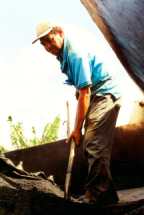|
|
|||
|
Home |
Best Abs Book |
Best Ab Exercises |
Abdominal Ball Exercises |
Abs Exercise Tips |
Abs for Sports |
Pregnancy & Abs |
Yoga |
Pilates |
Flat Stomach Diet |
Smoothie Recipes |
Weight Loss Stories |
Lose 10 Pounds |
Lower Back Pain |
Back Stretching Exercise |
Resources |
Free Calculators |
Site Map |
About
The Most Common Cause
|
|||
Some of you may be groaning right now because you are thinking of your mom or grandma who always nagged you to sit up straight. Or you have this image of military posture in your mind.
As a Physical Therapist, I often tell my patients that good posture is not just for looks. It can actually help you recover from low back pain or prevent it from ever starting in the first place. I have seen patients that improve just from correcting posture alone. It's also a major reason why some people continue to have recurring back pain.
This is because back pain typically results from stresses over time, not one single event. It's like the proverbial "straw that breaks the camel's back."
For example, I had a roomate in college that was simply bending over to pick up something on the floor and couldn't stand up afterwards. It wasn't that one time of bending over that was the cause of lower back pain for her. It was the many times of bending, shoveling snow, sitting with poor posture, etc. that over time resulted in an injury to her back.
Examples of Poor Posture
 So what types of positions can contribute to back pain?
So what types of positions can contribute to back pain?- Sitting slouched for long periods of time
- Repeated bending over (or staying bent over for a long time)
- Repeated twisting (or staying in a twisted or rotated position for a long time)
- Sleeping in a curled up position or twisted
Mechanical Lower Back Pain
What is mechanical pain? Well, it occurs when any joint in your body is in a position that over stretches the ligaments, muscles and other soft tissue in the surrounding area.
To further understand mechanical pain and the connection between posture and low back pain, let's try this experiment.
- Slowly bend your finger back until you feel a slight strain. What happens if you hold that position? Well, overtime you will feel an ache that will then turn into pain. It may take over an hour to feel the pain develop.
- Now bend your finger further past the strain to the point where you feel pain. You'll immediately feel it. This time you have overstretched your finger and your body sends a warning to you....that warning is pain. The warning says, "If you continue doing this, you'll harm me! So get out of this position!"
Just like you experienced mechanical pain in your finger, the same thing happens with your lower back. You may sit in a slouched position for hours before you feel an ache or pain. But, overtime it can cause more pain and eventually an injury if the posture is not corrected. The same is true with slouched standing, lifting, bending over, bent or twisted sleeping postures, etc.
The good news is that the strain that bad posture brings can easily be avoided. The neutral position of your back is a slight inward curve or lordosis. Your neck and lower back would look like a s-curve. However, so many times we sit and work in a position where our spine is a c-curve.
 In sitting this can easily be corrected by sitting up straight. Ears over shoulders over hips. However, over time our muscles get tired and we end up in the c-curve again.
In sitting this can easily be corrected by sitting up straight. Ears over shoulders over hips. However, over time our muscles get tired and we end up in the c-curve again.The solution for slouched sitting? A lumbar roll.
I usually recommend my patients to take a hand towel, roll it up and tape it to try using a lumbar roll before buying one. Make sure your hips are all the way back against your seat and then put the towel roll in the small of your back. You will notice that it helps you sit in a more erect, neutral posture that takes the strain off your ligaments.
You can buy lumbar rolls for $20-30 from places like optp.com. If the towel roll helps, it is definitely worth the investment to buy a lumbar roll for your car and maybe even another one for your office.
Proper Lifting
What about lifting? Most people say you should lift with your legs and not your back. This is true. But, it is also important to keep the weight close to you.
Bending over with a weight or holding it at a arm's distance away from your body puts significant strain on your back. You can usually feel the difference if you try it.
So, when you just try to lift with you legs, one of the common mistakes is keeping your feet close together. Then, in order to clear your knees, you have to hold the weight away from your body which still puts strain on your back.
The best way to lift is to stand with your feet further apart so you can lower the object to the floor between your feet, keeping your back in a slight inward curve where it is the strongest and least vulnerable for injury.
Now, I know that you will not always be able to lift like that. There are always going to be situations where you can't get into the "preferred" lifting position. But, when you apply these principles to the best of your ability to that situation, you will decrease your risk to injury significantly.
Next Steps
Now it's time to make it a habit! Some say it takes about 21 days to make a habit. That's 3 weeks. At first it will seem really hard to sit up straight and lift properly. But, over time it will get easier and easier. I promise! And you will be training the muscles that support the spine to keep good posture which will make it easier to sit up straight even when you don't have a lumbar roll.
Ultimately, the best motivator for good posture is pain. When correcting your posture takes away your pain, you better believe you'll be more motivated to sit up straight! But, take it a step further and make a decision to take care of your back and begin practicing good posture even when you don't feel the immediate pain. You back with definitely thank you.
Click here for more information about "Healthy Back Workouts"
Also Recommended...
Return to Low Back Pain ManagementAnatomy of the Back
Try the press up exercise, one way to do yoga for lower back pain.
Low back strengthening exercises
Back stretching exercises
The Bean Exerciser - One Way to Exercise Abs Without Back Pain
Return from Cause of Lower Back Pain to Abs Exercise Advice Homepage
Download 21 Free Abs Exercises
Enter your name and email address here to get your free download:
The ABS Lady Recommends:
Best Abs Book | Contact | Disclaimer | Privacy Policy
Copyright © 2004-2013 Abs-Exercise-Advice.com - All Rights Reserved.
Return to top